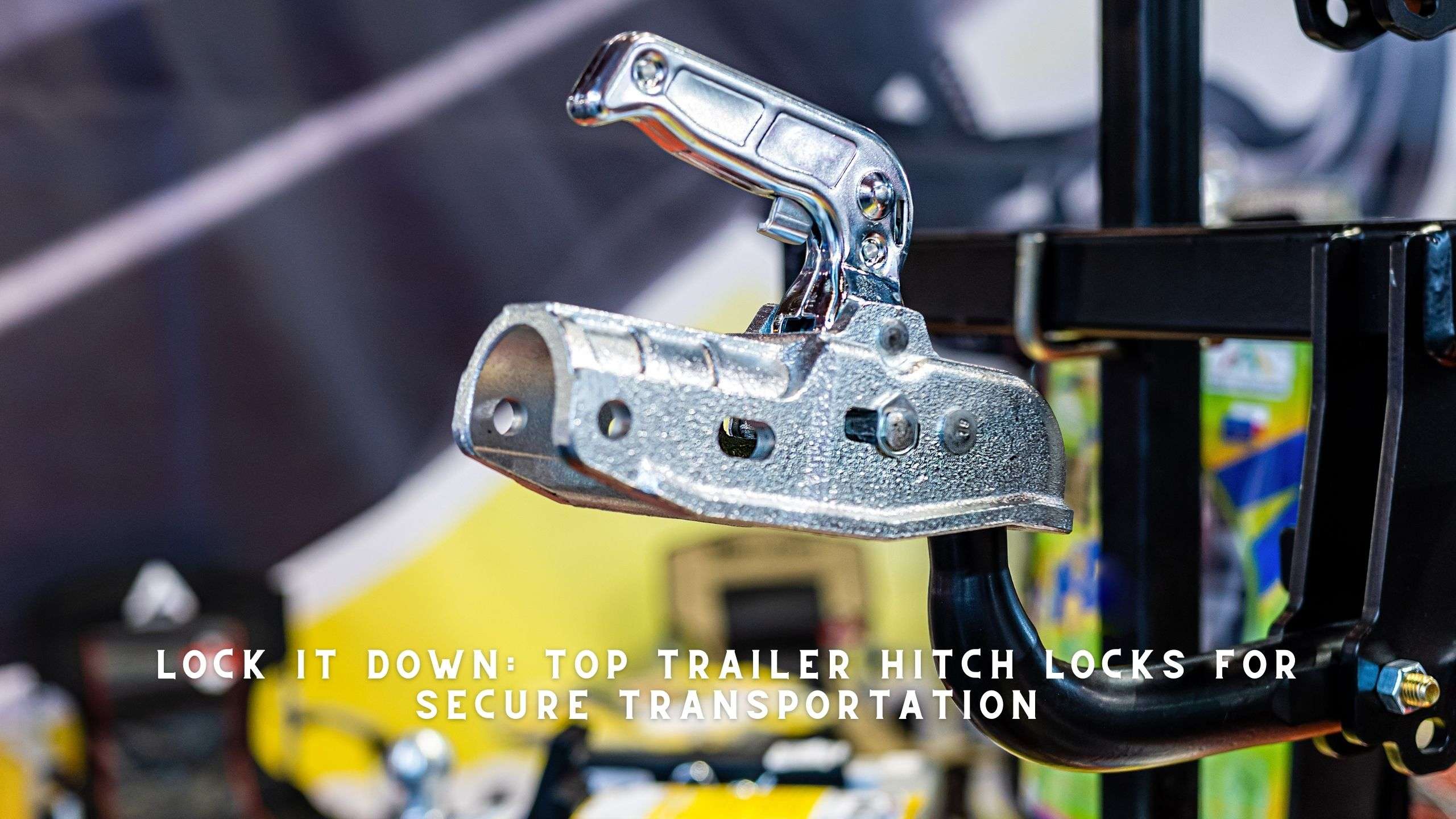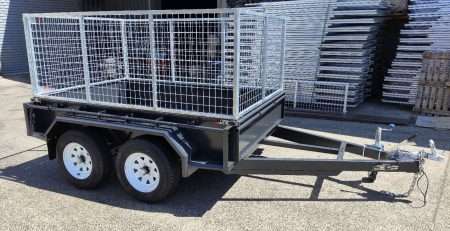
Lock It Down: Top Trailer Hitch Locks for Secure Transportation
Understanding Trailer Hitch Locks
In the world of heavy-duty transportation, there’s more to consider than just trailer brake controllers or trailer tongue jacks. One key component that often goes unnoticed but plays a crucial role in securing your trailer is the trailer hitch lock.
Basics of Trailer Hitch Locks
A trailer hitch lock is a device designed to prevent unauthorized access to a trailer hitch by securing it in place. Essentially, it serves as a theft deterrent for trailers and their contents, ensuring that your property stays safe and secure, even when left unattended.
But it’s important to remember that not all trailer hitch locks are the same. There are different types available on the market, each serving different purposes. Some locks are specifically designed for certain types of trailers, while others offer universal compatibility. It’s crucial to choose the right lock based on your specific needs and requirements, whether you’re using heavy duty trailer hitches or something more standard.
Importance of Trailer Hitch Locks
The importance of a good trailer hitch lock cannot be overstated. It serves several critical functions, including preventing theft, providing peace of mind, and ensuring the security of your trailer and its contents (The RV Geeks).
A good lock should be durable and resistant to tampering or picking, providing a robust line of defense against potential thieves. This makes trailer hitch locks an essential recommendation for anyone who owns a trailer or regularly uses one. They are particularly important for RV owners who tow their vehicles and leave them unattended in various locations (The RV Geeks).
In essence, a trailer hitch lock is much more than just a lock. It’s a small investment that can save you from potentially significant losses. So, while you’re considering your trailer lights and wiring or trailer safety chains, don’t forget to think about the security of your hitch as well. It’s one detail that can make all the difference.
Types of Trailer Hitch Locks
When it comes to securing your trailer, there isn’t a one-size-fits-all solution. There are different types of trailer hitch locks available on the market that serve different purposes. It’s important to choose the right lock based on your specific needs and requirements.
Coupler Locks
Coupler locks are the most common type of trailer hitch lock. They fit around the trailer’s coupler, preventing it from being lifted off the hitch ball. This design makes it difficult for anyone to hitch your trailer to their own vehicle and drive away with it without your permission.
Coupler locks are an excellent choice for those looking for a simple and effective way to secure their trailer. However, it’s important to note that different trailers have different types and sizes of couplers, so you need to ensure that the lock you choose is compatible with your specific trailer.
Receiver Locks
Receiver locks offer a different approach to trailer security. These locks are used to secure the hitch receiver itself. They’re inserted into the receiver tube, preventing the hitch from being removed or a trailer from being attached (Car and Driver).
Receiver locks are great for those who want to protect their hitch and their trailer simultaneously. Just like with coupler locks, it’s important to make sure that the receiver lock you choose is the right size for your hitch receiver.
Universal Locks
Lastly, we have universal locks. These are designed to fit a wide range of hitches and couplers, offering a versatile solution for trailer security. Universal locks often use a combination lock or key lock mechanism for added security.
Universal locks are a great choice for those who have multiple trailers or frequently switch between different types of hitches and trailers. They offer the convenience of a single lock that can secure a variety of different setups.
In conclusion, when picking the right lock for your trailer, consider the type of hitch you have, the type of trailer you’re securing, and your individual safety needs. Before you purchase any lock, always ensure it is compatible with your specific trailer and hitch setup. Remember, a trailer hitch lock is a valuable investment that serves as a theft deterrent for trailers and their contents. For more information on securing your trailer, visit our guide on heavy duty trailer hitches and trailer safety chains.
Selecting the Right Hitch Lock
Choosing the right hitch lock is crucial for the security of your trailer. There are various factors to consider when selecting a lock that suits your needs, including its material and durability, the locking mechanisms, and its compatibility with your trailer.
Material and Durability
The material of the hitch lock plays a significant role in its durability and resistance to tampering. We recommend hitch locks made from materials like hardened steel, which ensures maximum security and protection against theft. A good trailer hitch lock should be durable and resistant to picking, thus providing peace of mind and ensuring the security of your trailer and its contents.
Locking Mechanisms
The locking mechanism of a hitch lock is another important factor to consider. It should be simple to use but complex enough to deter potential thieves. Some hitch locks utilize key systems, while others might use a combination lock mechanism. The choice between these types often boils down to personal preference. Regardless of the type, the mechanism should be robust and capable of resisting attempts at picking or breaking.
Compatibility with Your Trailer
Lastly, it’s crucial to ensure that the hitch lock is compatible with your trailer. Hitch locks come in three main types: coupler locks, receiver locks, and universal locks (Car and Driver). Each type serves a different purpose and fits a specific kind of trailer hitch. Therefore, it’s essential to accurately measure your hitch and compare it with the specifications of the hitch lock to ensure a proper fit.
Remember, the best hitch lock for you will depend on your specific needs and circumstances. If you frequently leave your trailer unattended in various locations, for instance, you might want to invest in a high-end lock for maximum security. For more information on securing your trailer, check out our articles on heavy duty trailer hitches and trailer safety chains.
Top Brands for Hitch Locks
When it comes to securing your trailer, choosing a reputable brand for your hitch lock is essential. Some of the best trailer hitch locks on the market come from Trimax, Master Lock, and Reese. These brands are known for their durability, reliability, and effectiveness in preventing theft.
Trimax Hitch Locks
Trimax is a well-known name in the trailer security industry. They offer a variety of hitch locks that are designed to fit a wide range of couplers and receivers. These locks are constructed from high-quality materials and feature advanced locking mechanisms to deter theft.
Trimax hitch locks are praised for their durability and robustness, ensuring that your trailer remains securely attached to your vehicle. Whether you’re parking your trailer overnight or leaving it unattended for extended periods, Trimax hitch locks provide the peace of mind you need.
Master Lock Hitch Locks
Master Lock is another trusted brand offering high-quality trailer hitch locks. Known for their robust construction and excellent security features, Master Lock hitch locks are a popular choice among trailer owners.
Master Lock’s hitch locks are easy to install and operate, providing a hassle-free security solution for your trailer. Additionally, these locks are designed to withstand harsh weather conditions and resist corrosion, making them an excellent long-term investment for trailer security.
Reese Hitch Locks
Reese is a brand that’s synonymous with quality when it comes to trailer equipment. Their hitch locks are designed to provide reliable security for a wide range of trailers. Reese hitch locks feature solid construction and innovative locking mechanisms to deter potential thieves.
These locks are easy to use and install, making them a practical choice for any trailer owner. Furthermore, Reese offers excellent customer support, ensuring their customers get the most out of their products.
Choosing the right brand for your hitch lock is just the first step in securing your trailer. It’s also important to regularly inspect and maintain your lock to ensure it continues to function effectively. Remember, a well-secured trailer is a safe trailer.
For more information on trailer security and maintenance, be sure to check out our articles on trailer brake controllers, trailer lights and wiring, and trailer safety chains.
Regulatory Guidelines
Compliance with regulatory guidelines is a significant part of ensuring safe transportation when towing trailers. These guidelines, primarily established by the Federal Motor Carrier Safety Administration (FMCSA), provide clear instructions regarding safety devices, including trailer hitch locks.
FMCSA Regulations
Per section 393.70(d) of the FMCSA regulations, every full trailer must be coupled to the frame or an extension of the frame of the motor vehicle towing it with one or more safety devices. These safety devices aim to prevent the towed vehicle from breaking loose in the event of tow-bar failure or disconnection. This requirement ensures that the tow-bar will not drop to the ground in case of failure or disconnection (FMCSA).
If the drawbar design includes bolts, connecting pins, and so on, located at or near the midpoint of the drawbar beyond the attachment points for the safety chains, the safety devices must extend from either the frame of the towed or towing vehicle to a point beyond these components.
Safety Device Requirements
Pairing safety chains or cables between the towing vehicle and the front of a fixed-length drawbar, or an extendible drawbar, with a separate pair of safety chains/cables between the end of the drawbar and the front of the towed vehicle, may meet the requirements of § 393.70(d). However, the safety devices must be attached to the draw-bar and the vehicles in such a manner that prevents the drawbar from dropping to the ground in case of failure or disconnection. The arrangement of the safety devices should ensure that the vehicles will not separate if the drawbar fails or becomes disconnected.
In the case of an extendible drawbar or reach, if separate safety devices are used for the front and rear of the drawbar, there must be a means to ensure that the drawbar will not separate at the movable portion. The use of welded tube stops could meet the requirements of § 393.70(d) if the ultimate strength of the welds exceeds the impact forces associated with the drawbar suddenly extending with a fully loaded trailer attached.
Adherence to these regulations is not only a legal requirement, but it also ensures the safety of your vehicle, trailer, and the traffic around you. By choosing a trailer hitch lock that complies with these guidelines, you can ensure secure transportation of your trailer. For additional safety, consider equipping your trailer with trailer brake controllers, trailer safety chains, and trailer wheel bearings.
Maintaining Your Hitch Lock
Just like other trailer parts such as trailer brake controllers, trailer lights and wiring, or trailer safety chains, maintaining your hitch lock is crucial for its longevity and effectiveness. This involves regular inspection and proper cleaning and lubrication.
Regular Inspection
It is important to regularly inspect your trailer hitch locks to ensure that they are in good working condition and free from any damage or wear. Regular inspection can help identify any potential issues or weaknesses in the lock that may compromise its effectiveness (The RV Geeks).
Another crucial aspect of inspection is checking for any signs of tampering or attempted theft. Look for any unusual marks, scratches, or signs of forced entry on the lock or surrounding areas. Spotting these early can help prevent theft and save you from potential loss (The RV Geeks).
Regular inspection and maintenance of your hitch lock are essential to ensure its reliability and effectiveness in securing your trailer. Neglecting these tasks can lead to lock failure or compromise its ability to prevent theft (Car and Driver).
Proper Cleaning and Lubrication
In addition to regular inspection, it is important to clean and lubricate your hitch lock to ensure smooth operation and prevent rust or corrosion. Use a mild detergent and water to clean the lock, and apply a lubricant specifically designed for locks to keep it functioning properly.
Proper cleaning and lubrication of your hitch lock can help extend its lifespan and maintain its effectiveness in preventing theft. Regular maintenance can also help identify any issues that may require repair or replacement of the lock (The RV Geeks).
Keeping your trailer hitch locks in top condition not only safeguards your trailer but also gives you peace of mind during transportation. Regular inspection, proper cleaning, and lubrication are simple yet effective steps to ensure your hitch lock continues to serve its purpose effectively.
Author
I am Rahatul Ashiq Tamal. Another author of Muscle Trailers. Muscle Trailers is a well-known trailer brand in Sydney, Melbourne & Adelaide

How to Mount a Spare Tire on Your Trailer: A Simple Step-by-Step Guide
Trailer service centers receive over 1 million phone calls and 1.3 million emails each year about trailer maintenance problems....

How to Fix RV Roof Leaks: Simple Roof Leak Detection Guide for Beginners
Did you know DIY RV roof repairs can cost under $50? But undetected leaks could lead to substantially higher repair...

Starting a Food Truck Business in Australia: From Trailer Selection to Launch
The Australian mobile food market has evolved into a billion-dollar industry. This makes a food truck...
